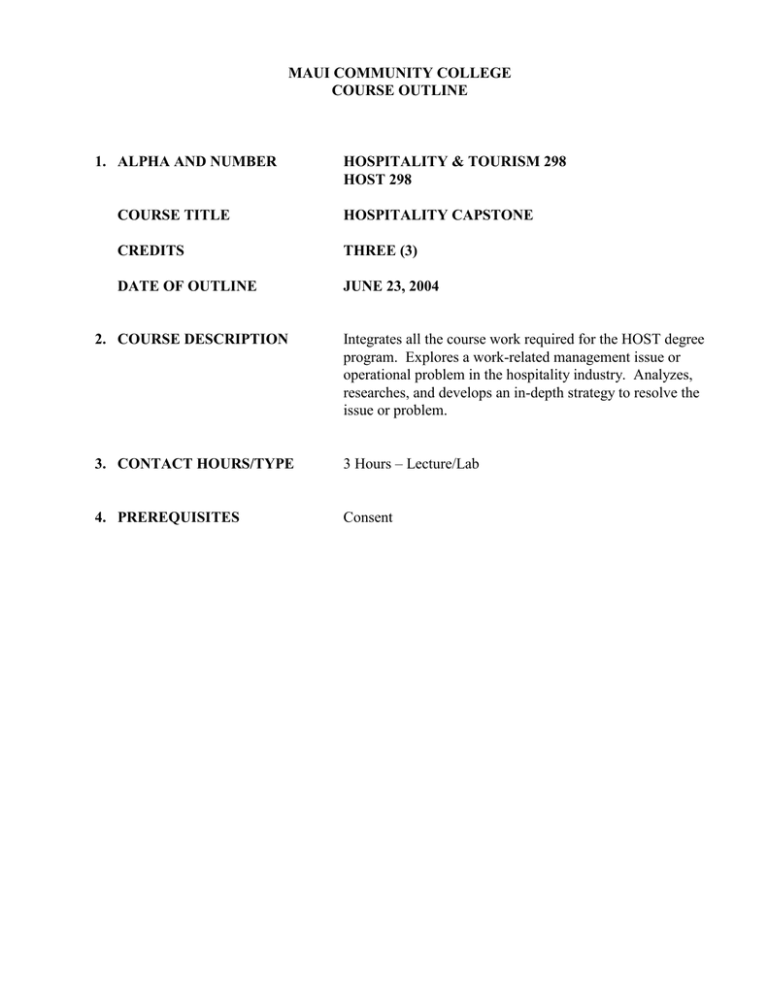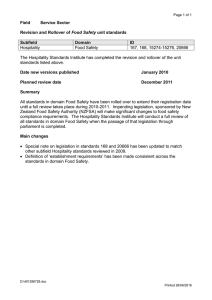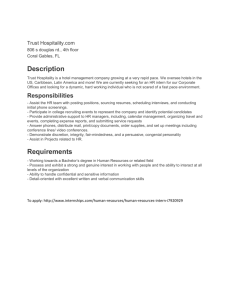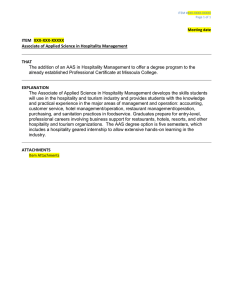MAUI COMMUNITY COLLEGE COURSE OUTLINE 1. ALPHA AND NUMBER
advertisement

MAUI COMMUNITY COLLEGE COURSE OUTLINE 1. ALPHA AND NUMBER HOSPITALITY & TOURISM 298 HOST 298 COURSE TITLE HOSPITALITY CAPSTONE CREDITS THREE (3) DATE OF OUTLINE JUNE 23, 2004 2. COURSE DESCRIPTION Integrates all the course work required for the HOST degree program. Explores a work-related management issue or operational problem in the hospitality industry. Analyzes, researches, and develops an in-depth strategy to resolve the issue or problem. 3. CONTACT HOURS/TYPE 3 Hours – Lecture/Lab 4. PREREQUISITES Consent APPROVED BY _____________________________________DATE _____________ 5. GENERAL COURSE OBJECTIVES This capstone course is designed to support students in bringing together all of the elements of their learning in the Hospitality A.S. program. Students work in collaboration with program coordinator and hospitality industry mentor to identify and study work-related management issues, analyze and research topics, then develop strategies to resolve the issues. Topics covered by this course may include environmental analysis, resource analysis, competitive analysis, strategy formulation, strategy implementation, international/national strategy and strategic control. Various modes of research, problem-solving techniques and presentation styles are utilized. The class culminates with a presentation by the students to peers, faculty, hospitality industry leaders, and external stakeholders. 6. STUDENT LEARNING OUTCOMES For assessment purposes, these are linked to #7. Recommended Course Content. Upon successful completion of this course, the student will: A. demonstrate the key functions required to successfully manage and lead a hospitality organization (i.e. planning, organizing, coordinating, staffing, supervising, financial analysis, sales/marketing, etc.).; B. assess a workplace issue, identify business strategies, develop plans for implementation, and evaluate implications of decisions; C. create, interpret, and analyze budgets and other operational reports (using a spreadsheet program such as Excel) to make recommendations and decisions to improve organizational performance; D. communicate effectively with diverse populations using visual, written, and oral skills required of daily activities in hospitality operations; E. apply critical thinking skills and decision-making skills when analyzing hospitality related issues; F. follow and develop standards of operation (SOP) for safety/security in the hospitality industry; G. analyze internal and external factors that influence the hospitality industry; H. describe the interrelationships of hospitality-related service industries; I. prepare and analyze financial statements; J. analyze information and apply quantitative reasoning methods appropriately to solve problems; H. develop and manage a work schedule; I. assess, interpret, analyze, and evaluate information using current technology (hardware and software) to make recommendations and solve issues in the hospitality and tourism environment; J. develop, use, and update procedures, criteria, and recommendations for equipment and supplies used in daily hospitality operations; K. apply the principles of human resource management within the context of industry and organizational standards; L. identify levels of proficiency required for employment in the hospitality industry; M. demonstrate leadership skills in team assignments; N. work independently and interdependently in a team setting; and O. communicate host culture knowledge 7. Recommended Course Content and Approximate Time Spent on Each Topic Linked to #6. Student Learning Outcomes. To meet the objectives of the course, the following areas of course content would be included in a class: 1 class session Introduction Icebreaker/get acquainted activity Introduction to the course syllabus including a discussion of course materials, assignments and projects 1 – 2 weeks Market Analysis [SLO A, B, C, D, E, G, H, I, M, N] The Market Market Demand 1 - 2 weeks Situation Analysis: Your Customers [SLO A, B, C, D, E, G, H, M, N] ] Customer Research Segmentation 1 - 2 weeks Operational Analysis [SLO A, B, C, D, E, G, H, I, M, N] Analyzing financial performance Evaluating financial ratios 1 - 2 weeks Competitor Analysis [SLO A, B, C, D, E, G, H, I, M, N] Competitor Performance & Analysis Writing the Business Plan (2-3 weeks) 2 - 3 weeks Making Decisions [SLO A, B, C, D, E, G, H, I, M, N ] Capital & Operating Expenditures Market forecast Advertising & Promotion Revenue Projections & Spreadsheets 2 – 16 weeks Hospitality Issue(s) [SLO A - O] 8. TEXT AND MATERIALS, REFERENCE MATERIALS, AUXILIARY MATERIALS AND CONTENT Appropriate text(s) and materials will be chosen at the time the course is offered from those currently available in the field. Examples include: TEXT AND MATERIALS, REFERENCE MATERIALS Top of the House. Hinton, Roy W. Kendall/Hunt Publishing Company Quality Service: What Every Hospitality Manager Needs to Know. Martin, William B. Prentice Hall Reference materials provided by hotels. AUXILIARY MATERIALS AND CONTENT Classroom/A.V. Equipment/Computer/Power Point Blackboard/Overhead Transparencies/Smart Board Industry Magazine Features/Newspaper Articles Appropriate Videos, Films, and TV Programs Other Appropriate Materials/Equipment Available Site Visitation Forms (i.e. required liability waivers, instructions for visitation and activities, etc.) 9. RECOMMENDED COURSE REQUIREMENTS AND EVALUATION GENERAL COURSE REQUIREMENTS Attendance & Participation Homework Assignments Tests and Exams Presentations, Demonstrations, Group Work, Exercises and other Projects 0–5% 0 – 20% 0 – 10% 70 – 80% Not to exceed 100% of grade These percentages establish a minimum and maximum range for area to be, or may be evaluated in this course. A faculty member, in a similar syllabus, would be capable of planning the evaluation of this course within these parameters to suit the method and number of presentations, his/her own teaching convictions, and/or the needs of the students accordingly. 10. METHODS OF INSTRUCTION Instructional methods will vary considerably with instructors. Specific methods will be at the discretion of the instructor teaching the course and might include, but are not limited to the following. a. lecture, class discussions, group activities, demonstrations, computer simulations; b. tests and exams with feedback and discussion; c. oral reports and other student presentation; d. projects, on-site classes, site visitations; e. powerpoint presentation, videos, DVDs, CD-ROMs with detailed viewing guide and discussion questions; f. cable/outreach/video streaming; g. appropriate videos/industry guest speakers; h. homework assignments such as researching current lodging industry issues and problems; i. group or individual research projects with reports or presentations; and j. other contemporary learning techniques (such as project-based learning, case-base learning, co-op, internships, self-paced programs, etc.)



